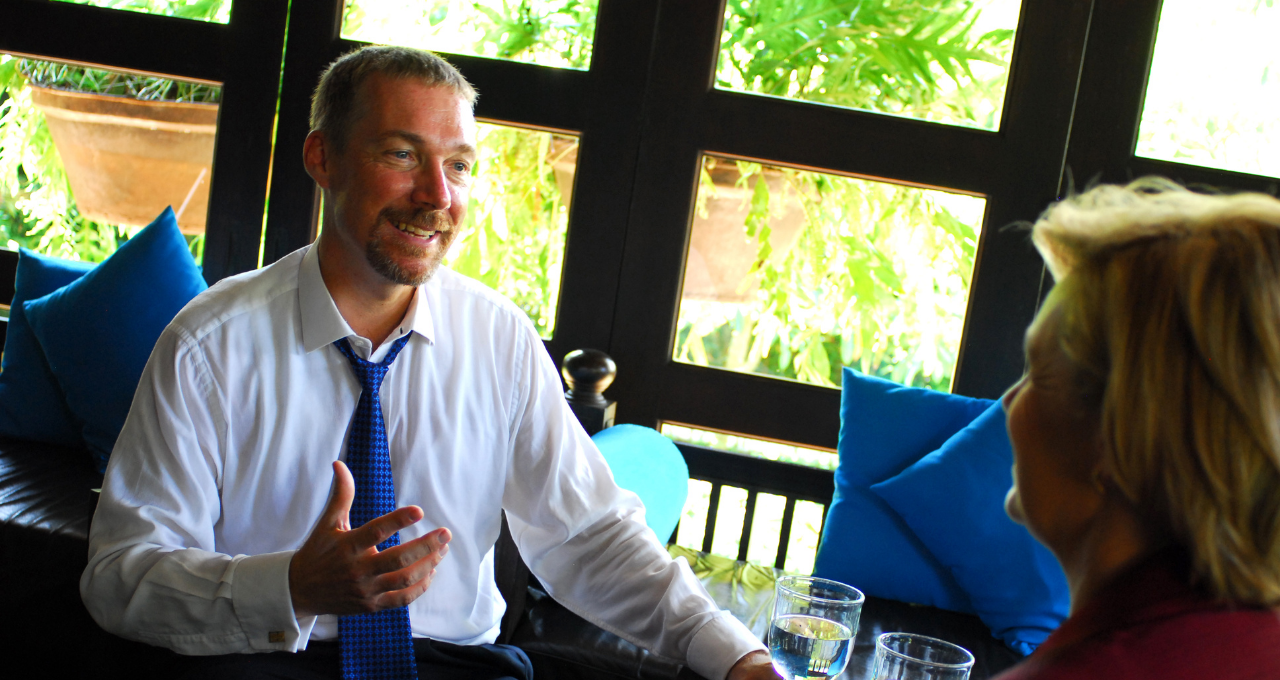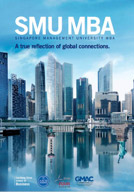
It might be hard for a published author and full-time faculty to acknowledge, but according to Associate Professor of Strategic Management (Practice) Gordon Perchthold, students no longer have the inclination to read. Specifically, readers do not possess the attention span to digest long-form books, having been conditioned by 280-character tweets and snappy social media captions.
“We all know the reality but pretend it does not exist,” says LKCSB Assoc Prof Perchthold.
“Few students and even fewer business managers read academic textbooks. Nor do students diligently read the chapters when professors assign them to students. Instead, books and chapters are only rapidly scanned by students to the extent necessary as they cram for a graded assessment.”
Having served over 40 multinationals as a Global Management Consulting Partner at Deloitte and in his own firm, then obtaining his PhD, Dr Perchthold believes that the 1,300-character LinkedIn post is the perfect tool for rapidly conveying a key message – the digital native’s equivalent of an elevator pitch. So much so that he decided to share his expertise on Asian history, culture, business systems and the management of multinationals via 144 “posts” in his new book Build & Manage Multinationals for Sustained Growth Across Asia, instead of following the format of a traditional academic textbook.
“In electronic or physical form, a book needed to unveil short, concise spoonfuls of knowledge,” reveals Assoc Prof Perchthold.
“Much like the ‘componentisation’ of software code or technologies, these spoonfuls of knowledge convey the key concepts and raise questions for students and industry managers to consider. And given I was writing a business book, following the format of the most successful social media platform for business, LinkedIn, did not require a PhD to figure out” he jokes.
The subject matter of the book is especially relevant for students based in Singapore — the world's most exposed economy to trade and internationalisation. This target audience is particularly attuned to the importance of Asia as a region, which makes the most significant contribution to the global GDP. Singapore is also home to the largest number of regional offices of multinationals in Asia, so it is an edge for students to know how to work and manage effectively in a multinational environment. Moreover, according to surveys, local graduates prefer to work for multinationals, hence the need for them to learn about other countries and cultures beyond Singapore to perform to management expectations.
Today, the complexities of managing multinational organisations is made all the more complicated by the developments brought about by Covid-19. Beyond supply chain disruptions and building resilience, Assoc Prof Perchthold notes that the pandemic has “disrupted normalcy and created much ambiguity”.
“Around the world, the pandemic has ignited the worst of tribal instincts when uncertainty is acute, with reports of outbursts at foreigners and foreign multinationals,” says Assoc Prof Perchthold.
“It makes it a difficult environment for multinationals to navigate. Becoming more mindful of cross-cultural differences and understanding that adverse behaviours are not personal, but instead reflects ignorance, will help avoid making inappropriate reactive decisions.”
And Assoc Prof Perchthold has certainly experienced the challenges of managing cultural differences first-hand, having lived and worked in multiple countries throughout his career. As the son of middle-class Austrian parents who had immigrated to Canada, he was accustomed to high parental expectations; working part-time as an automotive factory worker during summers while attending high school — a combination that motivated his pursuit of double university degrees in commerce and computer science.
In 1986, IT company Unisys Canada gave him the opportunity to relocate to its office in Australia to learn about EFTPOS (Electronic Funds at Point of Sale) technology. Eight years later, Deloitte Consulting then sent him for a project in Cape Town during the first free election in South Africa, where he met his wife. Thereafter, the couple worked in Tokyo in a spin-off of the company’s consulting practice in Japan, before establishing an entrepreneurial firm in Hong Kong.
In 2012, Assoc Prof Perchthold decided to move to Australia to pursue his PhD: "Western Financial Services Multinationals Differential Pathways to Commitment to Internationalisation in Asia: The Impact of Administrative Structures on Reverse Knowledge Transfer and Absorptive Capacity", at the University of Sydney.
“It was a huge risk leaving a lucrative profession with no certainty of employment, but I have never regretted the richness of knowledge and new opportunities realised,” shares Assoc Prof Perchthold.
“The critical life lesson is to 'seize the opportunity' for there will be ambiguity and angst, but you do experience cultures and live life.”
As successful as he was at being a citizen of the world, while taking on the role of a global management consultant advising multinationals about strategy and the configuration of their multi-country subsidiaries across Asia, Assoc Prof Perchthold recognised that researching internationalisation from an academic frame entails a different perspective. To him, the objective of being an academic was not only to fill in the gaps in his knowledge but to "give back" to university education “to help develop our next generation of international business managers”.
“One could say that to help our students avoid the mistakes that I and others of my generation made in the past as international business is a hugely complex endeavour,” says Assoc Prof Perchthold, who teaches two Business Capstone courses, Design Thinking, and Management of Multinationals Across Asia in the Lee Kong Chian School of Business.
“Within Asia, SMU was probably the only university I considered as it was a younger university whose participative, interactive, technology-enabled pedagogy aligned well with my teaching philosophy of practical integration of theory and practice. Fortunately, there was an opening, and I somehow managed to overcome the hurdles to secure a position – call it ‘serendipity’.”
Switching industry sectors, not simply as an Adjunct but embedded as academic faculty, required time to learn and adapt to different practices, principles and value systems.
As a management consultant, Assoc Prof Perchthold was already very data-driven and project-oriented, as is research and teaching in academia. However, he notes that the academic discipline places greater emphasis on methodology while industry is focused on realising results within fixed deadlines.
“Unfortunately for my students, I tend to have high expectations for actively engaging with concurrent streams of learning activities that reinforce the learning of content,” says Assoc Prof Perchthold.
“My courses do not allow students to listen to a lecturer ramble on, occasionally put up their hand to secure participation marks, and cram through and memorise pages of bullet points for a quiz. Not all students appreciate diversity and hard work.”
Students with the right attitude for active learning appreciate his unique teaching pedagogy, some of whom were even inspired to post on Assoc Prof Perchthold’s pet platform LinkedIn about how their learnings in his classroom gave them relevant knowledge and skills that will serve them well as they transition into the industry.
He adds: “Is that not the point of university – to learn, not just seek high grades? This is the reason why I have enjoyed teaching at SMU.”
Speak to our Admissions Advisors
Singapore Management University
Lee Kong Chian School of Business
Graduate Programmes Office, Level 4
50 Stamford Road, Singapore 178899
Tel: +65 6828 0882
Join us at the upcoming events
Via Gerolamo Cardano, 1, 20124 Milano MI, Italy
1 Raffles Drive, Makati Avenue, 1224, Makati City
Bayerstraße 41, 80335 München, Germany
You may also be interested in
Executive Master of Business Administration (EMBA)
